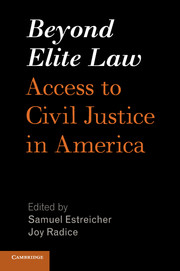Book contents
- Frontmatter
- Contents
- Beyond Elite Law
- Foreword
- List of Contributors
- Overview
- Overview
- PART I CURRENT STATE OF ACCESS TO LEGAL SERVICES
- PART II SOURCES OF LEGAL SERVICES ASSISTANCE FOR WORKING AMERICANS
- PART III FASHIONING A REFORM AGENDA
- PART IV CREATING A CULTURE OF SERVICE
- 43 Integrating Pro Bono with the Law Firm's Business
- 44 Facilitating Law Firm Pro Bono in Transactional Cases
- 45 What Bar Associations Can Do to Improve Access to Civil Justice
- 46 The Teaching Law Office: Service and Learning in the Law School Years
- 47 The Emergency-Room Law School Clinic
- 48 CUNY Law School's Community-Based and Community-Empowering Clinics
- 49 A New Law School in Texas to Address Unmet Legal Needs
- 50 Public Service Residency in Lieu of the Third Year of Law School
- Index
46 - The Teaching Law Office: Service and Learning in the Law School Years
from PART IV - CREATING A CULTURE OF SERVICE
Published online by Cambridge University Press: 05 May 2016
- Frontmatter
- Contents
- Beyond Elite Law
- Foreword
- List of Contributors
- Overview
- Overview
- PART I CURRENT STATE OF ACCESS TO LEGAL SERVICES
- PART II SOURCES OF LEGAL SERVICES ASSISTANCE FOR WORKING AMERICANS
- PART III FASHIONING A REFORM AGENDA
- PART IV CREATING A CULTURE OF SERVICE
- 43 Integrating Pro Bono with the Law Firm's Business
- 44 Facilitating Law Firm Pro Bono in Transactional Cases
- 45 What Bar Associations Can Do to Improve Access to Civil Justice
- 46 The Teaching Law Office: Service and Learning in the Law School Years
- 47 The Emergency-Room Law School Clinic
- 48 CUNY Law School's Community-Based and Community-Empowering Clinics
- 49 A New Law School in Texas to Address Unmet Legal Needs
- 50 Public Service Residency in Lieu of the Third Year of Law School
- Index
Summary
Jeanne Charn describes in this chapter the evolution of Harvard's pioneering teaching law office and the benefits of this model for both the law students and their clients. Present-day clinical programs can look to the teaching law office as a realistic, replicable model for serving the legal needs of people of modest means.
What role should law school clinics play in education for practice, particularly, though not exclusively, in the law school years? Is law student immersion in a high-quality, high-volume law practice an educational necessity that generates substantial client service? Decades of experience in a teaching law office at Harvard Law School suggests that clinics can make a substantial contribution to access to legal services both as direct providers and as developers of cost- and outcome-effective legal services.
THE “HARVARD MODEL”
The notion of a so-called “Harvard Model” of clinical education is rooted in the concept of a teaching law office analogous to the teaching hospital in graduate and post graduate medical education. The teaching law office idea involves an insistence that service and learning are not in tension but inextricably intertwined; a commitment to clinical practice in a fully functioning law office; an emphasis on the distinctive educational role of expert advocates mentoring novice students; a deliberate decision to prioritize the everyday legal needs of low- and moderate-income clients of the clinic; and a focus on what it takes to assure high-quality legal services.
The teaching law office at Harvard has accommodated many students and served hundreds of clients annually. It evolved in four distinct phases.
1964–1971: CLAO
Before the Johnson administration created the federally funded legal services program and the Council on Legal Education for Professional Responsibility (CLEPR) launched modern clinics, an informal faculty committee at Harvard conceived of and sponsored the Community Legal Assistance Office (CLAO). In the 1964–65 academic year, Committee members placed 34 students in the offices of the Boston Legal Aid Society but were not satisfied with the arrangement. Federal funding from the Office of Economic Opportunity (OEO) enabled the CLAO to test the efficacy of law student volunteers working with experienced, full-time legal aid lawyers. CLAO director John Ferren hired staff, sited the office in a low-income neighborhood a half hour from campus, and solicited student volunteers.
- Type
- Chapter
- Information
- Beyond Elite LawAccess to Civil Justice in America, pp. 656 - 666Publisher: Cambridge University PressPrint publication year: 2016



